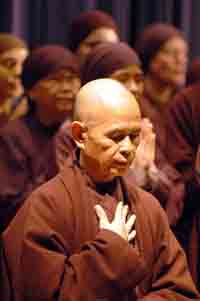 Communist Vietnam’s sometimes edgy relationship with religious freedom is being tested in a dispute over a monastery inhabited by disciples of Thich Nhat Hanh, one of the world’s most famous Zen masters.
Communist Vietnam’s sometimes edgy relationship with religious freedom is being tested in a dispute over a monastery inhabited by disciples of Thich Nhat Hanh, one of the world’s most famous Zen masters.
For four years, the Buddhist monks and nuns at Bat Nha monastery in central Vietnam have been quietly meditating and studying the teachings of the 82-year-old Vietnamese sage who is perhaps the world’s best-known living Buddhist after Tibet’s Dalai Lama. But lately, they are in a standoff that could test the patience of even the most enlightened. First, local authorities cut off their power, water and telephones. Then, a mob descended on their compound with sledgehammers, smashing windows, damaging buildings and threatening occupants.
Communist authorities have ordered the 379 Vietnamese monks to leave the monastery in Vietnam’s Central Highlands. They say the standoff stems from disagreements between two Buddhist factions at the monastery. But Hanh’s followers believe they are being punished because of Hanh’s praise for the Dalai Lama and his call to broaden religious freedom in Vietnam. The affair represents a remarkable turnaround from four years ago, when France-based Hanh returned to his native land after 39 years of exile during which he developed a philosophy called “Engaged Buddhism” and sold more than a million books in the West. The abbot at Bat Nha, which belonged to the official Buddhist Church of Vietnam, invited Hanh’s followers to train monks in their brand of Buddhism at the temple there. The letter also said that Hanh’s followers should leave Bat Nha and stressed that Abbot Duc Nghi, the property’s original owner, wanted them to go. Nghi could not be reached, and committee members declined to comment, saying they needed several days to arrange an interview.
Sister Dang said the Plum Village followers were taken by surprise when Nghi told them to leave because the abbot had visited the monastery in France two or three times and seemed to respect Hanh. She theorized that Nghi must have been pressured from above to ask the Plum Village practitioners to leave. Otherwise, she said, any tensions between the two camps could have been resolved.
James: Vietnam will one day have full religious freedom and what a joy that day will be!! I hope to visit this beautiful, stunning country one day but I don’t have the money to travel there right now. When I do, however, I hope to meet a reader from Vietnam–I know there are some from that great country who read this blog and I thank-you for reading. May the power of the people seeking freedom break down the cold structure of Communism and in a peaceful, Gandhi-like fashion. Trying to contain freedom is like trying to contain water. Water blocked by unbending, restrictive rocks will always find a way to erode them and continue on its way toward joining the open, vast freedom of the sea and ocean. Water has carved through some of the strongest rock to form natural wonders that inspire awe, respect and unrestrained possibilities. The concept of change as taught in Buddhism is no exception.
The saying, “Time heals all wounds” is over-used and sometimes simplistic but is important to remember as it enables people to endure things that they thought weren’t possible and for longer periods of time than thought possible. Buddhists seem better prepared and capable of enduring long hardship and suffering than some because of the Buddha’s teachings of the inevitability of suffering, dealing with anger but also the inevitability of change. In this case the inevitability that Vietnam will change it’s government and allow full and fair religious freedom.
Thich Nhat Hanh speaks often of the idea of seeds, “The seed of suffering in you may be strong, but don’t wait until you have no more suffering before allowing yourself to be happy.”
— Thich Nhat Hanh (The Heart of the Buddha’s Teaching).
Source : The Buddhist Blog




